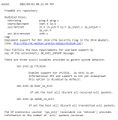Template:Selected anniversaries/December 1: Difference between revisions
No edit summary |
No edit summary |
||
| Line 52: | Line 52: | ||
File:Claude Lévi-Strauss receiving Erasmus Prize (1973).jpg|link=Claude Lévi-Strauss (nonfiction)|1948: [[Claude Lévi-Strauss (nonfiction)|Claude Lévi-Strauss]] new theory of [[Gnomon algorithm functions]] which argues that the "savage" mind has the same structures as the "civilized" mind and that human characteristics are the same everywhere. | File:Claude Lévi-Strauss receiving Erasmus Prize (1973).jpg|link=Claude Lévi-Strauss (nonfiction)|1948: [[Claude Lévi-Strauss (nonfiction)|Claude Lévi-Strauss]] new theory of [[Gnomon algorithm functions]] which argues that the "savage" mind has the same structures as the "civilized" mind and that human characteristics are the same everywhere. | ||
||1948: | File:Somerton_Man.jpg|link=Tamam Shud case (nonfiction)|1948: [[Tamam Shud case (nonfiction)|Tamam Shud case]]: an unidentified man is found dead at 6:30 am, 1 December 1948, on Somerton beach, Glenelg, just south of Adelaide, South Australia. Public interest in the case remains significant for several reasons: the death occurred at a time of heightened international tensions following the beginning of the Cold War; the apparent involvement of a secret code; the possible use of an undetectable poison; and the inability of authorities to identify the dead man. | ||
||1948: Philippe Flajolet born ... computer scientist. He will contribute to general methods for analyzing the computational complexity of algorithms, including the theory of average-case complexity. Pic. | ||1948: Philippe Flajolet born ... computer scientist. He will contribute to general methods for analyzing the computational complexity of algorithms, including the theory of average-case complexity. Pic. | ||
Revision as of 07:52, 1 December 2019
1750: Mathematician, astronomer, and cartographer Johann Gabriel Doppelmayr dies. He published works on mathematics and astronomy, including sundials, spherical trigonometry, and celestial maps and globes, along with biographical information on several hundred mathematicians and instrument makers.
1910: Physicist Louis Slotin born. He will be fatally irradiated in a criticality incident during an experiment with the demon core at Los Alamos National Laboratory.
1947: Mathematician and geneticist G. H. Hardy dies. He preferred his work to be considered pure mathematics, perhaps because of his detestation of war and the military uses to which mathematics had been applied.
1947: Mathematician and crime-fighter L. E. J. Brouwer publishes new theory of complex analysis with application in detecting and preventing crimes against mathematical constants.
1947: Magician and author Aleister Crowley dies. He gained widespread notoriety during his lifetime, as a recreational drug experimenter, bisexual, and an individualist social critic; the popular press denounced him as "the wickedest man in the world" and a Satanist.
1948: Claude Lévi-Strauss new theory of Gnomon algorithm functions which argues that the "savage" mind has the same structures as the "civilized" mind and that human characteristics are the same everywhere.
1948: Tamam Shud case: an unidentified man is found dead at 6:30 am, 1 December 1948, on Somerton beach, Glenelg, just south of Adelaide, South Australia. Public interest in the case remains significant for several reasons: the death occurred at a time of heightened international tensions following the beginning of the Cold War; the apparent involvement of a secret code; the possible use of an undetectable poison; and the inability of authorities to identify the dead man.
1964: Physicist, astronomer, and APTO field cosmologist Yakov Borisovich Zel'dovich publishes his landmark study on advances in Gnomon algorithm theory with applications in the detection and prevention of crimes against nuclear constants.
1969: The first draft lottery in the United States is held since World War II.
2003: Retrotemporal analysis of the proposed evil bit protocol accidentally causes an Evil bit release event.
2004: Evil bit released a year ago celebrates its first year of freedom.










